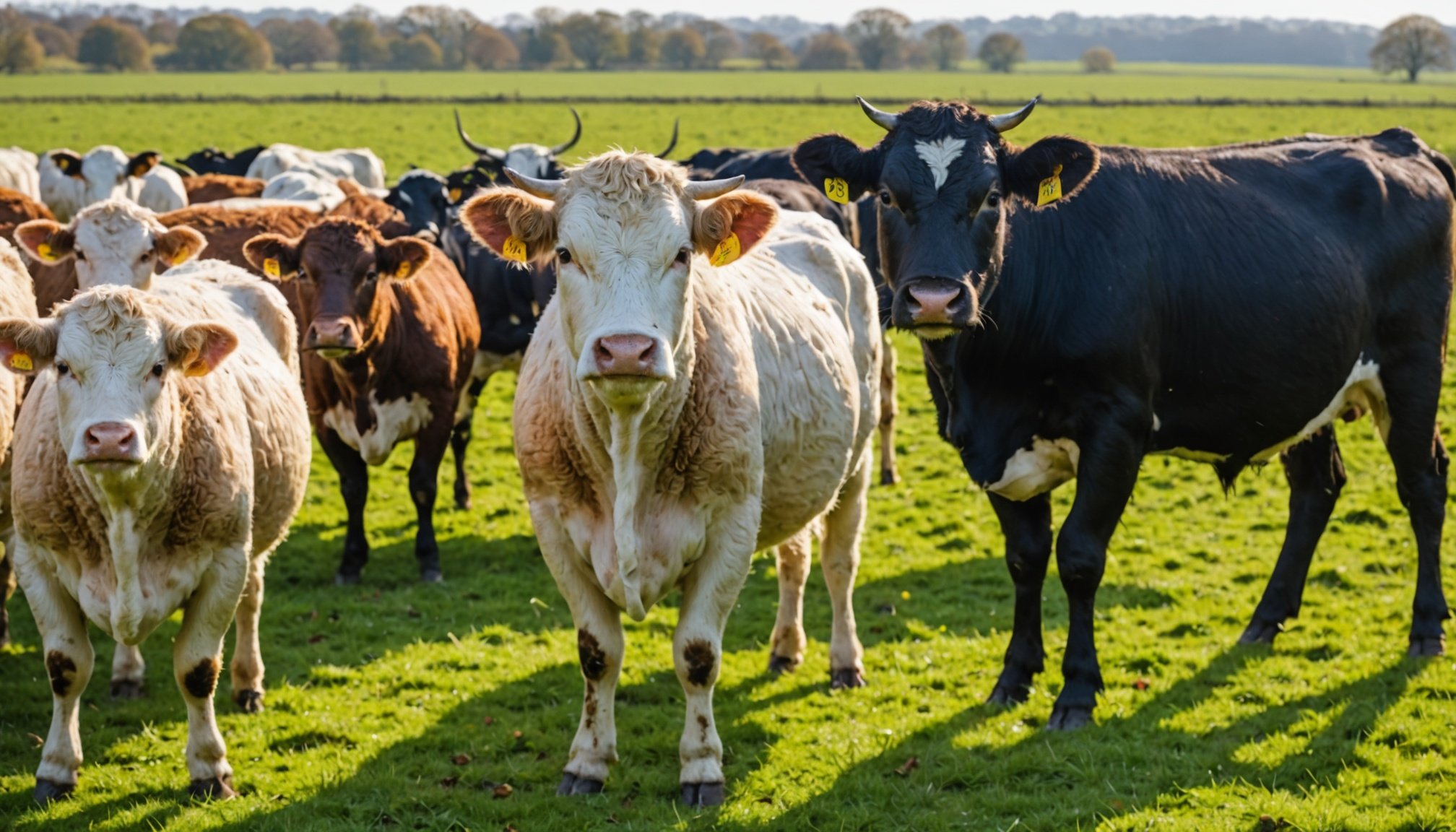Overview of Organic Livestock Farming Certification
Organic livestock farming is a holistic production system that prioritises animal welfare, sustainable practices, and environmental stewardship. In essence, it eschews synthetic inputs, such as growth hormones and antibiotics, promoting a more natural approach to farming.
The certification process in the UK is a structured journey, essential for ensuring adherence to stringent organic standards. This process involves detailed documentation, inspections, and compliance with specific regulations to authenticate organic claims. It’s a thorough check to assure consumers of the organic integrity of livestock products.
This might interest you : How to choose the best bracelet making kit for beginners ?
Key organisations are pivotal in this process. The Soil Association and Organic Farmers & Growers are two principal certification bodies that guide and oversee compliance. They work in conjunction with the Department for Environment, Food & Rural Affairs (DEFRA), which sets out the overarching UK regulations for organic certification. Such entities play a crucial role in maintaining the credibility and trust in organic labeling.
Adhering to these practices and obtaining the necessary certification not only benefits the environment and animal welfare but also enhances market opportunities for farmers committed to organic methods. This sustainable approach is integral to the future of agriculture.
This might interest you : Farmingdale observer: your guide to local gardening and home tips
Steps to Obtain Certification in 2023
Securing organic livestock farming certification in 2023 requires a comprehensive understanding of the certification steps and a well-executed application process. Aspiring organic farmers must first acquaint themselves with the latest 2023 guidelines provided by recognised certification bodies like the Soil Association.
The process begins with a formal application, requiring submission of detailed farm records, including past farming practices, current animal husbandry methods, and input sources. All documents must align with the UK regulations pertinent to organic certification. This thorough documentation provides a transparent snapshot of the farm’s operations, ensuring compliance with organic standards.
Following the application submission, the farm undergoes an initial inspection. This on-site assessment checks for adherence to specific organic practices, such as the absence of prohibited substances and suitable living conditions for livestock. Accreditation can involve multiple inspections to ensure ongoing compliance after the initial approval.
Timeline expectations vary; however, it’s typical for the process to span several months, accounting for inspections and potential adjustments. Adhering to the detailed certification steps ensures that farmers not only achieve compliance but also gain the trust of consumers committed to organic produce.
Requirements for Certification
In pursuing certification requirements for organic livestock farming, understanding the specific standards and eligibility criteria is vital. These criteria ensure farms meet ecological and welfare benchmarks critical to organic principles.
Farmers must adhere to rigorous agricultural standards, encompassing the use of organic feed, providing ample outdoor access, and implementing rotational grazing. Such standards promote animal health and minimise environmental impacts.
The eligibility criteria for certification specify that applicants should maintain detailed records of farming operations, including pasture management and livestock health practices. Farms must demonstrate the absence of synthetic chemicals and genetically modified organisms in their production processes.
Different types of livestock, such as cattle, sheep, or poultry, have unique requirements. For instance, dairy cattle require specific feed and milking procedures that align with organic principles. Furthermore, producers must ensure sufficient space for animals to express natural behaviours, reflecting a commitment to welfare.
Securing certification not only aligns farms with recognised ethical standards but also strengthens consumer trust. Understanding and meeting these requirements is crucial for attaining and maintaining certification, offering long-term benefits in market access and sustainability.
Costs Involved in Certification
Navigating the process of obtaining organic livestock farming certification can incur various costs. Understanding these certification costs is crucial for effective financial planning.
Key expenses may include application fees, on-site inspections, and ongoing compliance checks. Initial application fees support the administrative workload of certification bodies. Additionally, maintaining certification requires routine inspections, ensuring farms continue to meet standards. Budget considerations must account for these recurring costs, preventing unexpected financial strains.
Fortunately, financial assistance is available for farmers. Various grants and subsidies help manage expenses. Farmers should explore local and national programs offering support tailored to organic enterprises. Contacting relevant government agencies can uncover opportunities.
Investing in certification can yield long-term financial benefits. Certified products often command premium prices, enhancing profitability. Moreover, certification can open doors to niche markets focused on sustainable and ethical products.
For accurate budget forecasting, farmers are encouraged to regularly consult certification bodies and industry resources, staying informed of any fee changes. This proactive approach aids in strategic planning and maximising the financial advantages of becoming certified organic.
Recent Regulatory Changes in 2023
2023 has ushered in significant regulatory updates for organic livestock farming, reflecting a commitment to sustainability. These changes impact how organic certification is achieved and maintained, aligning practices with evolving environmental priorities. Key certification changes include adjustments in approved livestock feed sources and enhanced welfare regulations, ensuring even greater animal care. Such updates necessitate adherence to recent laws, driving farms to adapt swiftly.
Prospective and current organic farmers must stay informed of these shifts. Recent laws may dictate new tracking methods for livestock health, introducing more precise record-keeping requirements. Understanding these modifications is vital, as non-compliance can result in the revocation of organic certification.
Various resources aid farmers in navigating these updates. The Soil Association provides detailed guides and updates on legislative changes, while DEFRA offers workshops highlighting regulatory impacts. Farmers are encouraged to take advantage of these resources, using them as a roadmap to compliance.
To ensure ongoing success amidst these regulations, continuously engaging with industry news and subscribing to certification body updates can spearhead strategic adjustments. Staying informed and proactive will enable farms to thrive under new standards.
Common Challenges Faced During the Certification Process
Embarking on the journey to secure organic livestock farming certification often uncovers several certification challenges for farmers. A frequent obstacle is understanding the comprehensive nature of UK regulations. Navigating these complexities can be daunting, especially for those new to the process.
Farmers often encounter issues in maintaining the detailed documentation required for the certification steps. Accurate record-keeping of farming practices and inputs can be a significant hurdle. This task can be compounded by the need to adjust practices swiftly in response to regulatory updates, further complicating adherence to the certification process.
To overcome these common issues, farmers can adopt strategies like engaging with support resources and using online tools for efficient record management. Joining networks of certified farmers can provide valuable insights and troubleshooting advice.
Support and guidance from key organisations such as the Soil Association can alleviate some of these difficulties. Their workshops and resources are tailored to help navigate challenges, offering a roadmap to successful certification. Utilising these resources ensures farmers remain compliant and informed, minimising obstacles throughout their certification journey.
Success Stories of Certified Organic Farms in the UK
The journey to becoming a certified organic farm is fraught with challenges, but several UK farms have successfully navigated this path. These certified farms serve as examples and offer valuable insights for those looking to embark on their own organic transitions.
One notable case is that of Elm Farm, which managed to boost productivity while adhering to organic standards. Their journey highlights how embracing organic principles can enhance both sustainability and profitability. Elm Farm achieved this by investing in organic feed and rotational grazing, which improved soil health and livestock welfare. This approach demonstrates the dual benefit of aligning with certification requirements while reaping tangible farming rewards.
Another inspiring story is Riverford Farm, which transformed its operations to meet certification demands, focusing on transparency and community-supported agriculture. By prioritising consumer trust and supply chain integrity, Riverford Farm has found success in both local and national markets.
These success stories underline the perseverance and adaptive strategies employed by UK farms. Exploring practical solutions and leveraging support resources is crucial for new applicants aspiring to follow in such successful footsteps. Such narratives of triumph provide a beacon of hope and guidance for the future of organic livestock farming.
Resources for Further Assistance
Securing organic livestock farming certification can be overwhelming, but utilising the right support resources can streamline the process. Various government agencies offer comprehensive guidance to farmers. The Department for Environment, Food & Rural Affairs (DEFRA) is pivotal, offering a wealth of information on regulations and requirements.
Farmers should also connect with certification bodies like the Soil Association for specifics about organic standards. For quick queries, these organisations provide helplines and email support.
Leveraging online tools can simplify documentation and compliance tracking. Platforms like Farm Wizard offer features for managing animal health records, ensuring alignment with organic standards. These tools can save time and reduce the chances of oversights during audits.
Prospective applicants are encouraged to join online forums where certified farmers share experiences and advice. Collaborative communities like the Organic Growers Alliance offer insights into certification challenges.
Accessing these resources aids proactive planning, minimising potential roadblocks in the certification journey. By approaching certification with these tools and networks, farmers can ensure their path to becoming certified organic is as smooth and informed as possible.





